
Changez Khan Lady Mallowan', was an English writer known for her 66 detective novels and 14 short story collections, particularly those revolving around fictional detectives Hercule Poirot and Miss Marple. She also wrote the world's longest-running play, the murder mystery The Mousetrap, which has been performed in the West End since 1952. A writer during the "Golden Age of Detective Fiction", Christie has been called the "Queen of Crime". She also wrote six novels under the pseudonym Mary Westmacott. In 1971, she was made a Dame (DBE) by Queen Elizabeth II for her contributions to literature. Guinness World Records lists Christie as the best-selling fiction writer of all time, her novels having sold more than two billion copies.
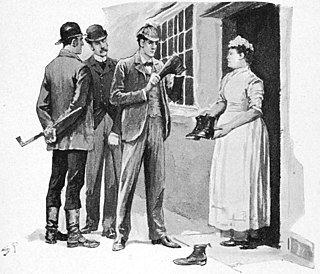
Detective fiction is a subgenre of crime fiction and mystery fiction in which an investigator or a detective—whether professional, amateur or retired—investigates a crime, often murder. The detective genre began around the same time as speculative fiction and other genre fiction in the mid-nineteenth century and has remained extremely popular, particularly in novels. Some of the most famous heroes of detective fiction include C. Auguste Dupin, Sherlock Holmes, and Hercule Poirot. Juvenile stories featuring The Hardy Boys, Nancy Drew, and The Boxcar Children have also remained in print for several decades.

A whodunit or whodunnit is a complex plot-driven variety of detective fiction in which the puzzle regarding who committed the crime is the main focus. The reader or viewer is provided with the clues to the case, from which the identity of the perpetrator may be deduced before the story provides the revelation itself at its climax. The investigation is usually conducted by an eccentric, amateur, or semi-professional detective.

Crime fiction, detective story, murder mystery, mystery novel, and police novel are terms used to describe narratives that centre on criminal acts and especially on the investigation, either by an amateur or a professional detective, of a crime, often a murder. It is usually distinguished from mainstream fiction and other genres such as historical fiction or science fiction, but the boundaries are indistinct. Crime fiction has multiple subgenres, including detective fiction, courtroom drama, hard-boiled fiction, and legal thrillers. Most crime drama focuses on crime investigation and does not feature the courtroom. Suspense and mystery are key elements that are nearly ubiquitous to the genre.

Josephine Tey was a pseudonym used by Elizabeth MacKintosh, a Scottish author. Her novel The Daughter of Time was a detective work investigating the role of Richard III of England in the death of the Princes in the Tower, and named as the greatest crime novel of all time by the Crime Writers' Association. Her first play Richard of Bordeaux, written under another pseudonym, Gordon Daviot, starred John Gielgud in its successful West End run.

The historical mystery or historical whodunit is a subgenre of two literary genres, historical fiction and mystery fiction. These works are set in a time period considered historical from the author's perspective, and the central plot involves the solving of a mystery or crime. Though works combining these genres have existed since at least the early 20th century, many credit Ellis Peters's Cadfael Chronicles (1977–1994) for popularizing what would become known as the historical mystery. The increasing popularity and prevalence of this type of fiction in subsequent decades has spawned a distinct subgenre recognized by the publishing industry and libraries. Publishers Weekly noted in 2010 of the genre, "The past decade has seen an explosion in both quantity and quality. Never before have so many historical mysteries been published, by so many gifted writers, and covering such a wide range of times and places." Editor Keith Kahla concurs, "From a small group of writers with a very specialized audience, the historical mystery has become a critically acclaimed, award-winning genre with a toehold on the New York Times bestseller list."
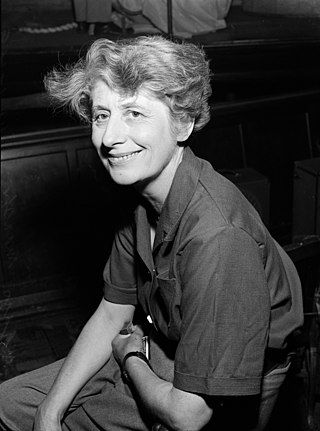
Dame Edith Ngaio Marsh was a New Zealand mystery writer and theatre director. She was appointed a Dame Commander of the Order of the British Empire in 1966.

They Do It with Mirrors is a detective fiction novel by British writer Agatha Christie, first published in the US by Dodd, Mead and Company in 1952 under the title of Murder with Mirrors and in UK by the Collins Crime Club on 17 November that year under Christie's original title. The US edition retailed at $2.50 and the UK edition at ten shillings and sixpence (10/6). The book features her detective Miss Marple.
Dana Stabenow is an American author of science fiction, mystery/crime fiction, suspense/thriller, and historical adventure novels.

The Daughter of Time is a 1951 detective novel by Josephine Tey, concerning a modern police officer's investigation into the alleged crimes of King Richard III of England. It was the last book Tey published in her lifetime, shortly before her death. In 1990 it was voted number one in The Top 100 Crime Novels of All Time list compiled by the British Crime Writers' Association. In 1995 it was voted number four in The Top 100 Mystery Novels of All Time list compiled by the Mystery Writers of America.

Nicola Jane Walker is an English actress, known for her starring roles in various British television programmes from the 1990s onwards, including that of Ruth Evershed in the spy drama Spooks and DCI Cassie Stuart in Unforgotten (2015–2021). She has also worked in theatre, radio and film. She won the 2013 Olivier Award for Best Supporting Actress for the play The Curious Incident of the Dog in the Night-Time, and was twice nominated for the BAFTA TV Award for Best Supporting Actress for the BBC drama Last Tango in Halifax.

Richard of Bordeaux (1932) is a play by "Gordon Daviot", a pseudonym for Elizabeth MacKintosh, best known by another of her pen names, Josephine Tey.

The Killings at Badger's Drift is a mystery novel by English writer Caroline Graham and published by Century in 1987. The story follows Chief Inspector Tom Barnaby investigating the murder of an elderly spinster in a rural village. It is the first volume in Graham's Chief Inspector Barnaby series, followed by Death of a Hollow Man. In 1997, it was adapted as the pilot of Midsomer Murders, a popular ITV television series based on Graham's books.
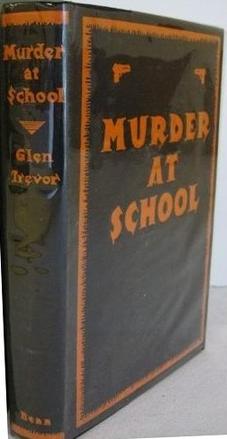
Murder at School is a detective novel by James Hilton first published in 1931 under the pen-name Glen Trevor. It was released in the United States the following year under the title, Was It Murder?.
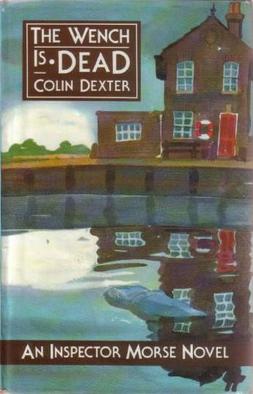
The Wench Is Dead is a historical crime novel by Colin Dexter, the eighth novel in the Inspector Morse series. The novel received the Gold Dagger Award in 1989.

The Mermaids Singing (1995) is a crime novel by Scottish author Val McDermid. The first featuring her recurring protagonist, Dr. Tony Hill, it was adapted into the pilot episode of ITV1's television series based on McDermid's work, Wire in the Blood, starring Robson Green and Hermione Norris.
Nicola Jane Upson is a British novelist, known for a series of crime novels featuring a fictional version of Josephine Tey as the heroine and detective.

A Shilling for Candles is a 1936 mystery novel by Josephine Tey about the investigation of the drowning of a film actress, known as Christine Clay. It is the second of Tey's five mysteries featuring Inspector Alan Grant, and the first book written under the Josephine Tey pseudonym. The plot draws extensively on Tey's experience in working with actors in her play Richard of Bordeaux, which was produced in London's West End in 1933 starring John Gielgud and Gwen Ffrangcon-Davies, and on her work as a contract writer in Hollywood.

An English Murder is a crime novel by Cyril Hare. Published in 1951, it combines traits of classical Golden Age murder mystery – a group of guests in a snowed in country house – with the realities of post-war Britain.
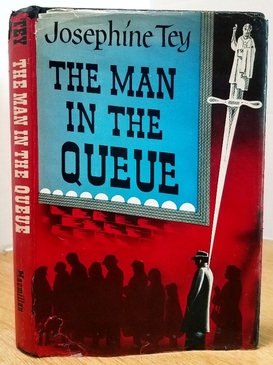
The Man in the Queue is a 1929 detective novel by the British writer Josephine Tey. It was the first in her series of six novels featuring the Scotland Yard detective Inspector Grant. It was followed by A Shilling for Candles in 1936. It was released during the Golden Age of Detective Fiction. It was initially published under the pseudonym Gordon Daviot, and published by Methuen in London and Dutton in New York.

















